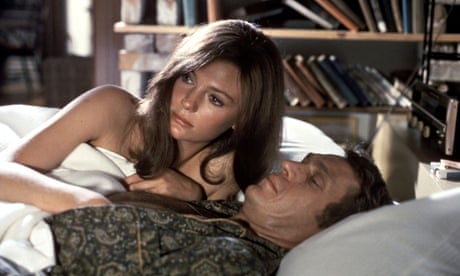Jacqueline Bisset
'Older women continue to want sex but men don't want to sleep with them'
In Welcome to New York, she plays the long-suffering wife of an adulterous financier, based on Dominique Strauss-Kahn. Here she talks about sexual desire and what divides men and women
Catherine Shoard
@catherineshoard
Thursday 24 July 2014 17.17 BST
Jacqueline Bisset would be lost without her snozz. "I could never sleep with someone who didn't smell right," she says. "For me, smell is intoxicating. It's an animal thing and very, very dangerous." What's the ideal odour? "I can't possibly sum it up. Not like perfume, but clean, for sure – I'm not into smelly armpits." She smiles and sips her peach juice. We're sitting at a breakfast bar in a French hotel, fruit platter in front and sax Muzak in the background. "Probably when you're in love you have some sort of addiction. You can't see straight. Voice is another one that pulls a woman back. When you're trying to break up with someone and you hear them on the telephone – suddenly you're back in that place."
When she shares such theories with male friends, she says, they tend to tell her smell doesn't share the same potency for them. "'What?' I say. 'You're nuts! I find that really hard to believe.' 'Jacqueline, you're wrong – men don't care about that.'" Her eyes pop in shock at the memory.
Bisset's new film, Welcome to New York, makes much of the notion of universal primal weakness, that women and men are equally enslaved by their hormones. Bisset plays Simone, long-suffering wife of Gérard Depardieu's vastly adulterous financier Georges Devereaux (the film is inspired by the downfall of Dominique Strauss-Kahn). Director Abel Ferrara gave both actors free rein to improvise; in one scene, following Georges' release from custody on an attempted rape charge, Simone bemoans the fact that one whiff of him is all it takes for her to be back in his thrall. You can see why Ferrara was keen to keep in the final cut the idea that irrational action is a biological function.

But while Georges protests that he is stuck in a cycle of promiscuity in the hope that the women's youth will rub off on him, such behaviour is presumably not so common among older women? That's just a matter of courage, Bisset thinks. After all, the female sex drive doesn't diminish with fertility. "Older women continue to want sex, they're horny, they want to connect. But the men don't want to sleep with those women."
And indeed Simone is one of the few women Georges doesn't sleep with in the movie, which is as much an ode to the charisma of Depardieu and the chutzpah of Ferrara as a study of the tragic fallout of sexual addiction. Scepticism comes in flecks, more goggling at the man's gall than assessing his soul. It's about getting away with it – Depardieu as well as Strauss-Kahn.
Bisset says Depardieu was "tender, open, helpful". He was also "like a big bear – and it's hard to handle a bear". Bisset has history with such wrangling. She cut her teeth playing opposite some of cinema's biggest beasts: Steve McQueen in Bullitt, Frank Sinatra in The Detective, both in 1968 when she was 24, then toe to toe with Christopher Plummer, Jon Voight, Charles Bronson and Marcello Mastroianni in the 70s.
Her beauty and bilingual exoticism (born in Weybridge, she was educated at the Lycée Charles de Gaulle in London) often threatened to eclipse her talent; in 1977, a wet T-shirt scene in The Deep further emphasised her pinup credentials over her acting chops. During the past 30 years she has primarily been on the small screen: sometimes in trash, but often in classier productions such as Nip/Tuck and, most recently, Stephen Poliakoff's Dancing on the Edge. It was for this that she won, earlier this year, a Golden Globe for best supporting actress in a miniseries. But it was her speech – an idiosyncratic, fatigue-induced ramble invoking her late mother and condemning her enemies to hell – that made the headlines. In Cannes, too, she demonstrates some of the same frank distraction at the post-screening post-midnight press conference; garrulous, almost guileless, in conversation. At 69, she's still a knockout – rake-thin, gleaming-eyed – but conscious that her charisma no longer relies on her looks. It doesn't need to.
Her beauty and bilingual exoticism (born in Weybridge, she was educated at the Lycée Charles de Gaulle in London) often threatened to eclipse her talent; in 1977, a wet T-shirt scene in The Deep further emphasised her pinup credentials over her acting chops. During the past 30 years she has primarily been on the small screen: sometimes in trash, but often in classier productions such as Nip/Tuck and, most recently, Stephen Poliakoff's Dancing on the Edge. It was for this that she won, earlier this year, a Golden Globe for best supporting actress in a miniseries. But it was her speech – an idiosyncratic, fatigue-induced ramble invoking her late mother and condemning her enemies to hell – that made the headlines. In Cannes, too, she demonstrates some of the same frank distraction at the post-screening post-midnight press conference; garrulous, almost guileless, in conversation. At 69, she's still a knockout – rake-thin, gleaming-eyed – but conscious that her charisma no longer relies on her looks. It doesn't need to.
She likes Welcome to New York, she says. She would personally have made a few changes: got to Simone sooner, given her more light and shade, more context ("I thought: 'Golly, we don't have a place to fall from'"). That opening orgy she would have trimmed, too. Sex scenes without emotional interaction are a turnoff. "If it goes on too long I have a tendency to think: 'Oh, bravo, they're doing that very well,' and then when it's over I'm back."
Working on the movie raised a lot of questions for her, she says. She speaks of the potential benefits and drawbacks of porn, of why lesbian couples might or might not work as prostitutes, of the moment at which sex could become transactional for a disillusioned spouse ("I think it's not until money changes hands that someone becomes a whore"). Bisset may have dealt with a generation of men eyeballing her but she feels sexual etiquette is now evolving at a pace that is hard to process.
"If we were in a different society, maybe one man would have 100 women, or his best friend would sleep with his wife. In other places they have God knows what combinations."

Bisset's own history – four long-term partners, two children – has fed in to her work, she says, both directly (as in Welcome to New York) and cumulatively. "I think most women have been through some sort of agony with this stuff. It can destroy your life completely. I think where there's a great deal of love a lot of excuses are made. Because it's so rare to love somebody."
She chews a strawberry and continues. "But I think there are men who can handle quite a few women at once, and do. I hear of people who've had three families. It seems amazing that they have time. Lots of men encourage people to be like that. They hang around and go to bars and stuff and there's no respect for women there. I don't even know if these guys like women."
What does she think drives them? "It's all self-glorification, narcissism, probably a terrible self-loathing and desperate insecurity. Needing to prove all the time. Never content with the one person viewing them with love. Checking they're still attractive, especially as they get older. Women feel that too – needing that extra little wink from somebody."
Bisset must still get her fair share of those. You hope she gets friendly encouragement, too. She's ruled by a strong intolerance for fools borne from a real sense of compassion and fairness. Making Welcome to New York, she did feel a responsibility towards DSK's real-life ex-wife, she says. But she didn't feel sympathy for her apparent outrage at the final film. "Just as we get criticised as actors if we make a misstep, so do people in the public eye. We get torn to pieces. We get physically criticised – openly ridiculed at times – and you have to take it. It's called free speech."
So how does she cope? She smiles with a polished tolerance. "I try really hard not to react. You have a choice: either you make it into a big deal or you hope it was said without viciousness. Life doesn't work if you react all the time. I believe in good behaviour. I have to take responsibility for myself. And I know my heart is clean."
Welcome to New York opens in the UK on 8 August (2014)




No comments:
Post a Comment